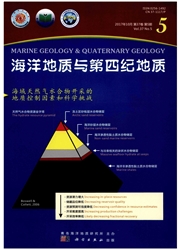

 中文摘要:
中文摘要:
通过钻孔、年代地层、沉积物粒度和有孔虫组合综合分析,并配合探地雷达,对洪门古沙堤的成因类型以及古海岸环境进行了探讨。洪门古沙堤沉积物和海州湾现代沙滩、苏北平原贝壳堤相比较,颗粒集中在粗砂一板粗砂范围,分选性偏差,板有可能形成于靠近河口或受河口影响的环境。探地雷达揭示洪门古沙堤曾有过向海方向的进积和生长,指示当时沙源丰富。洪门古沙堤的浅钻地层反映了洪门地区在6400aBP左右为滨海沼泽环境,此时期与青莲岗文化期的年代相吻合;湖沼沉积结束后,洪门地区迎来了中全新世的最大海侵,受周围地形的制约,洪门地区可能形成了河口浅海湾环境,普遍沉积了2m左右的青灰色淤泥沉积,有孔虫组合反映当时的环境并非完全开敞,而是受到一定程度限制的近岸浅水环境,反映了洪门地区为浅海湾环境;6000aBP左右,随着砂砾质沉积物供应的丰富以及相对海平面下降,洪门古沙堤开始发育,直到5000aBP苏北和连云港地区普遍发生海退,古沙堤发育结束。
 英文摘要:
英文摘要:
Based on core log,^14C dating,grain size analysis as well as ground-penetrating radar images, genesis of Hongmen coastal barrier and the environment were discussed. Four cores are available along ground-penetrating radar transects. The cored sedimentary succession in the coastal barrier of Hongmen area can be subdivided into three units from bottom to up. The bottom unit is mainly composed of gray to dark gray clay with calcareous concretion, which is interpreted as an exposed unit formed 6 400 aBP. This unit followed by an extensive transgression clay, probably formed in a near-shore, shallow (〈20 m) and hyposaline (ca. 30 ) environment in accordance with foraminifera assemblages. At about 6 000 aBP, the coastline kept steady, and in this circumstance, an increase of sandy supply or a decline of relative sea level was triggered by the development of coastal barrier in Hongmen area. The lower part of the barrier is mainly composed of coarse sandy granule, with great amounts of shell. It gradually becomes granule coarse sand into the upper part of the barrier. These sandy barriers can be chronologically correlated to the sandy barriers of north Jiangsu. After about 5 000 aBP, the sea level declined and probably retreated from the area, meanwhile the development of the sandy barriers stopped. Deposits of Hongmen coastal barrier are coarser than those of modern Haizhou Bay beach and cheniers of northern Jiangsu coastal plain. The grains are concentrated between 0-1 Ф, with a worse sorting than in modern Haizhou Bay beach sediments. It indicates that the Hongmen coastal barrier is very close to a river mouth area where flooding can carry coarse materials. The ground-penetrating radar is tentatively used to augment standard geomorphic and stratigraphic techniques. The radar images show a series of seaward oblique reflectors, which indicate a coastal progra- dation during barrier growth. This coastal progradation can be interpreted as having lots of material supply during that time. The results show th
 同期刊论文项目
同期刊论文项目
 同项目期刊论文
同项目期刊论文
 期刊信息
期刊信息
